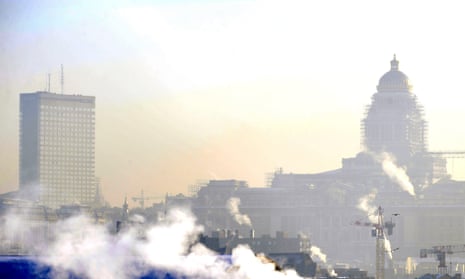Weak draft EU rules for coal plant emissions could result in 71,000 deaths and €52bn (£37bn) of health costs across Europe in the decade to come, according to new research published on Wednesday.
A Greenpeace investigation earlier this year found that the coal standards would be more lax than those in China, and the Guardian was able to corroborate claims by the green group that industry had helped to write the pollution rules.
The new study commissioned by Greenpeace and the European Environment Bureau analysed the impacts of the watered-down rules, and found that nearly 1,000 deaths and £500m of health costs a year are likely in the UK alone. But it said they could be prevented with technologies such as selective catalytic convertors.
Without these, thousands more cases of cardiac and respiratory illness that disproportionately affect children are foreseen by the study.
The paper forecasts a surge in asthmatic symptoms affecting over 2m children aged between five and 19, as well as 200,000 new cases of acute bronchitis among 6-12 year olds.
Christian Schaible, a policy manager for the European Environmental Bureau said: “The commission is opting for the cheapest techniques to reduce emissions but the health effects alone will be far more costly than the money saved by coal plant operators. These effects will also be felt by many thousands of European citizens, particularly children, in ways that money cannot quantify.”
The cost of installing plant technologies such as activated carbon injections to abate mercury emissions – associated with IQ loss in children – would be less than €0.02 per kilowatt hour, Schaible said.
The report’s findings emerged from a modelling study by an independent consultant to the European Environment Agency, which was then combined with emissions data.
The paper compared draft European commission emissions standards for pollutants such as nitrogen oxide (NOx), sulphur dioxide (SO2), particulate matter (PM2.5) and mercury against the best available techniques.
The EU’s proposed new limits are currently awaiting examination by an EU working group later this year. After that, they are expected to be formally adopted within the bloc’s industrial emissions directive in 2016.
The updated directive would cut NOx and SO2 emissions by around 70% and 50% respectively. But the most effective technologies could deliver more than twice as much, according to the study.
“Proposed emission limits for mercury are so lenient that an estimated 85% of European plants are already in compliance and will not have to invest in retrofitting,” the report says.
The Guardian has previously revealed that despite claims by the UK to the contrary, energy industry representatives repeatedly and forcefully pushed for weaker pollution limits at meetings in Brussels.
Doug Parr, Greenpeace UK’s chief scientist, said: “EU leaders have completely failed to stand up to the energy industry’s pervasive lobbying for weak air pollution limits. If these lax rules are adopted, hundreds of thousands of UK and European citizens will pay the consequences for their political leaders letting polluting industries off the hook.”

Comments (…)
Sign in or create your Guardian account to join the discussion